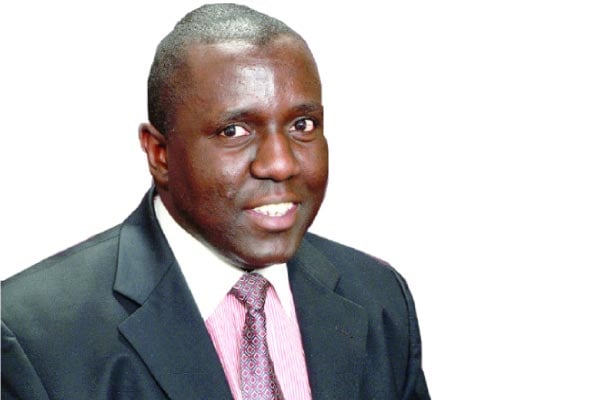Prime
Joyce Mpanga: Girl-child advocate, first minister of women affairs

Buganda second deputy premier Robert Waggwa Nsibirwa (right) with another official lay a wreath on the casket containing Mpanga’s remains on November 23, 2023.
What you need to know:
- Launching the book on December 4, 2019, Nnabagereka Sylvia Nagginda hailed Mpanga as a “pioneer of women’s emancipation and a true champion of equity and equality.”
When Buganda Kingdom announced the death of Joyce Rovincer Mpanga, many Ugandans took to social media and other platforms to pay tribute to the 90-year-old for her various contributions towards the development of Uganda.
Buganda on its part praised her for spearheading promotion of kingdom values as one of the members of the Lukiiko (kingdom parliament).
On the side of the central government, Mpanga was hailed for her contribution to shaping the country’s education policy when she served as minister of Women in Development from 1988 to 1989 and the minister of State for Primary Education from 1989 to 1992.
However, one of the standout roles she has been hailed for is advocating for women rights.
Dating back to her school days at Gayaza High School, Mpanga is said to have been at the forefront of supporting girl-child education and supporting more women to take up leadership positions at various levels of society.
On behalf of Gayaza Old Girls Association, Ms Victoria Sekitoleko said the late Mpanga was a fighter for women’s rights and a woman of many firsts.
Ms Sekitoleko, who served as Uganda’s Agriculture minister from 1986 to 1995, said Mpanga was among the first women to be nominated to the Uganda National Assembly in 1960 and was also the first African woman lecturer in the Faculty of Education at Makerere University.
“She was also the first female graduate with a master’s degree, first minister of women affairs in Uganda; and first female minister for Primary Education in Uganda, and Gayaza High School’s first African deputy headmistress,” Ms Sekitoleko said.
Ms Mpanga was admitted to Gayaza High School in 1946 where she spent six years, leaving in 1952. She returned to the school in 1962 as the deputy headmistress.
She served as deputy chairperson of the school Board of Governors and was chairperson for Gayaza’s Centenary (100 years anniversary) celebrations.
Mpanga was also a great writer and is the author of a biography titled, ‘It’s a Pity She’s Not a Boy!’ which is a story about her fight for girls and women’s voice and place in society.
Launching the book on December 4, 2019, Nnabagereka Sylvia Nagginda hailed Mpanga as a “pioneer of women’s emancipation and a true champion of equity and equality.”
In his eulogy, Katikkiro Charles Peter Mayiga said Mpanga and her husband Fredrick Mpanga, who passed away in the 1970’s, played a key role in supporting Buganda’s exiled king Edward Muteesa and prince (now Kabaka) Ronald Mutebi, when they were in England.
“They were very close to Prince Mutebi throughout his time in exile. Joyce Mpanga was one of the key persons in the restoration process of the Kingdom of Buganda, and she has served as a member of the Buganda Lukiiko until her death,” he said.
He also added that at the coronation event, the Kabaka awarded Joyce Mpanga the highest kingdom honour of the spear and the shield (Ekitiibwa eky’Amafumu n’Engabo).
“She has been one of the key figures in the struggle for women emancipation and she was the first minister for women affairs in the early days of the NRM government,” Mr Mayiga said.
Women rights advocate and former ethics minister Miria Matembe said Mpanga is one of those people who stood with her as she advanced the cause of gender equality and women empowerment.
“When I came on the public platform in 1986, I was so passionate to embrace the NRM affirmative action for women to run for gender equality but Mpanga advised me on how I should handle the cause ,”she said.
She added that Mpanga used to advise young women political leaders to go slow for the purpose of achieving what they were aiming for.
“Mpanga is one of the great women who participated with men to struggle for our independence, she is a role model for the women of Uganda in a number of areas,” she said.
“Ms Mpanga and Ms Rodah Kalema never disappointed women, especially when they needed them for women functions, even three months back, she attended a certain women event even on her wheelchair,” she added.
Ms Matembe pledged not to let down Mpanga whom she described as national hero in advocating for the women’s cause.




